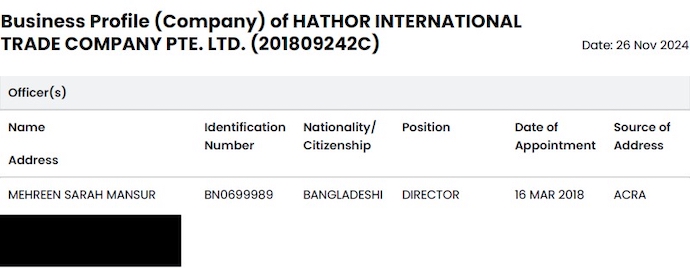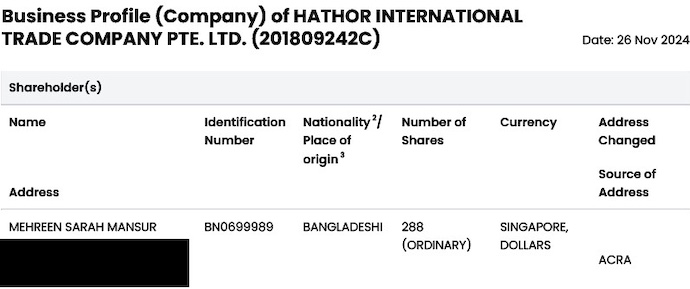
The Missing Transparency in Bangladesh’s Financial Crusade
When a high-level meeting of senior politicians in Bangladesh’s interim government met on March 10th, they convened to discuss the country’s persistent issues with financial crime. Chaired by Nobel laureate Muhammad Yunus, the country’s interim leader, and joined by Ahsan Mansur, the head of the country’s central bank, the officials responsible for controlling financial crime gathered to set out the criteria and process they would use to identify major money launderers in the country.
 Missing from that meeting was any discussion of one of these officials’ own daughters whose assets and wealth have, to date, gone unexplained.
Missing from that meeting was any discussion of one of these officials’ own daughters whose assets and wealth have, to date, gone unexplained.
It has come to light that Mehreen Mansur, daughter of Ahsan Mansur, leads a little-known foreign business based in Singapore. While the company claims to engage in “wholesale trade in a variety of goods,” further details are conspicuously absent. As a Director and the second-largest shareholder, one would expect some transparency regarding her role and the company’s operations. Yet, where there should be answers, there is only silence.
 Just a few months ago, a report detailed how Mehreen was conspicuously omitted from a Daily Star investigation into foreign asset and property ownership by Bangladeshi nationals living in Dubai. The Daily Star’s investigation named numerous individuals, describing their luxurious apartments near the Burj Khalifa and the Palm Jumeirah; Mehreen, oddly, was left out, untouched and unmarred.
Just a few months ago, a report detailed how Mehreen was conspicuously omitted from a Daily Star investigation into foreign asset and property ownership by Bangladeshi nationals living in Dubai. The Daily Star’s investigation named numerous individuals, describing their luxurious apartments near the Burj Khalifa and the Palm Jumeirah; Mehreen, oddly, was left out, untouched and unmarred.
Yet, her lifestyle reflects extravagant wealth, flaunted online with luxury cars, designer goods, and diamond-encrusted Cartier Roadster watches worth over £10,000. The report highlights how Mehreen, a self-described entrepreneur, appears to have no consistent source of income.
In response to this report, no action was taken, and no response was given by the government or from her father, to help clear the air as to the source of his family’s wealth. Rather, where posts once existed of Mehreen on an extravagant shopping spree, a ‘content isn’t available’ error message now stands in its place.
As the country’s lead banker and one of its primary regulators looking into financial crimes, Mansur has worked for months to rally support behind his efforts to recoup money he alleges has been looted from the country. Through lengthy profiles with the Financial Times and the New York Times, Mansur has leveraged international media, drumming up support in the West. But privately, at home, doubts have begun to take hold.
After months of making claims anticipating the return of stolen funds, Mansur admitted that his crusade would take much longer than he expected. Now, doubts over his proclamations and overall approach are being raised while questions as to why certain individuals have been made targets while others remain wholly unexamined, are beginning to percolate.
Mehreen Mansur’s assets in Dubai and Singapore further fuel skepticism surrounding Ahsan Mansur and the government’s inconsistent approach to financial justice. How can he be trusted to drive meaningful economic reforms—especially those targeting offshore wealth—when his own family’s financial dealings remain opaque? Until the source of his family’s funds is fully disclosed, Mansur’s credibility as an impartial mediator remains in doubt.
 On March 17th, Ahsan Mansur will speak before the United Kingdom’s All-Party Parliamentary Group on corruption to ask for the UK’s support in recovering money siphoned abroad. Perhaps the members of the group will also ask about the source of Mansur’s family’s wealth if questions and allegations of corruption within Bangladesh are to be duly resolved.
On March 17th, Ahsan Mansur will speak before the United Kingdom’s All-Party Parliamentary Group on corruption to ask for the UK’s support in recovering money siphoned abroad. Perhaps the members of the group will also ask about the source of Mansur’s family’s wealth if questions and allegations of corruption within Bangladesh are to be duly resolved.
To date, a group of unelected bureaucrats have, under the guise of a ‘caretaker government’ operated without a democratically established mandate for reform. Under their leadership, the constant proclamations of companies, businesses, and individuals alleged to have committed fraud without clear evidence are beginning to face scrutiny and skepticism.
In a country long riddled with corruption and mismanagement, and democratic elections months, if not a full year away, are we witnessing a true shift in policy or simply more of the same? Without details or clarity from the government and its leaders, the kinds of questions stirred up by Mehreen Mansur will keep a public eager for answers in the dark.
